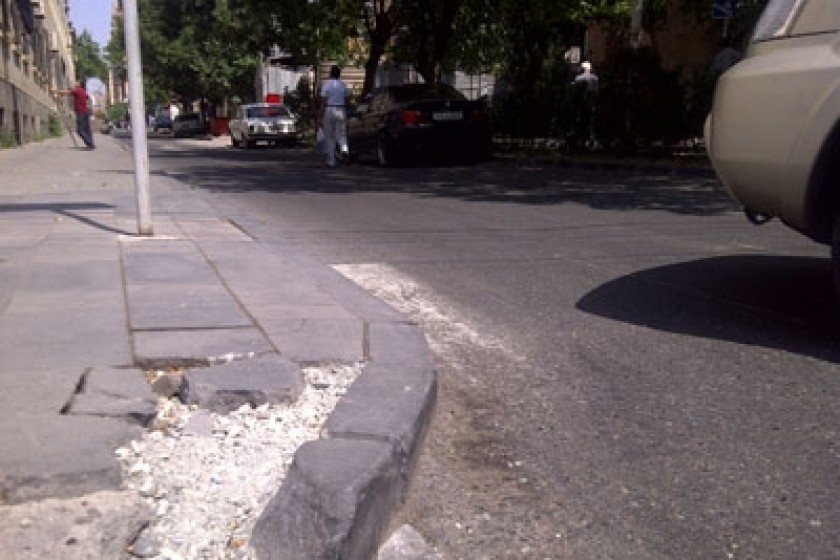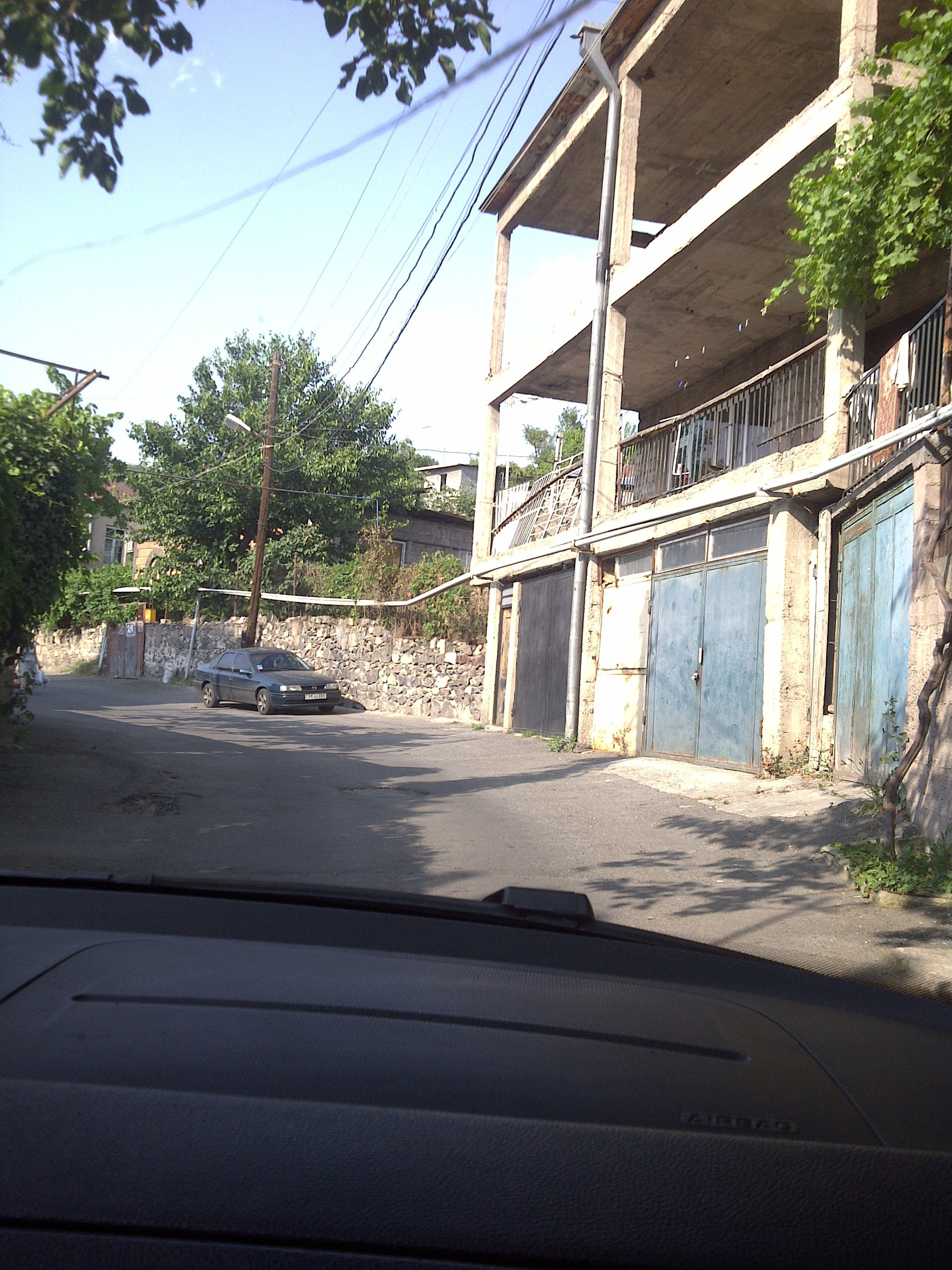
An American in Armenia: Day 3 – In Turn, an Internship
By Samuel Armen
Anna swept and swerved between the byzantine labyrinth of pot holes, unexpected bumps, and courageous pedestrians with the masterfulness of a native. Though this prior description may awaken the feeling of danger to a reader, I had already made the decision to put my trust in Anna – one of our two supervisors – with the steering-wheel of my well-being. Her and Aline – our second supervisor – together are the faces of efficiency in our group. I am not saying this to advertise others to join YSIP, or for single men to go check out these lovely ladies, but rather to detail a memory that gives well-deserved praise and my sincere thanks.
She was driving three interns and me down to our jobs. We would walk, call cabs, or take the metro in the future. Anna had decided together with Aline that it would be most efficient if they would drive us personally to our internships. That way, we could learn the roads, notate the areas dense with taxi service, and even find cafés and restaurants in our proximity.
I was the first to be dropped off; I got out of the car.
“Wait here,” Anna said to the other three interns as she got out and led me to a vast salmon-colored building.
 The interior was partially dilapidated, but clearly in the process of very modern renovation. Together, we took the elevator lift to the 6th floor – which was the highest it was supposed to go. We exited and climbed two flights of stairs to the 8th floor then turned and walked into the office.
The interior was partially dilapidated, but clearly in the process of very modern renovation. Together, we took the elevator lift to the 6th floor – which was the highest it was supposed to go. We exited and climbed two flights of stairs to the 8th floor then turned and walked into the office.
I let my eyes take in what was most immediate: Reflective wood floors, two sofas and one couch that were asparagus green, a tremendous view of Yerevan, and a dozen computers with workers typing Armenian letters quickly onto magazines pages or selecting photos in albums of people, events and locations.
The room was rectangular, and we entered on the left side near the kitchen. We walked towards the right side. Anna already knew my lack of Armenian speaking skills so she explained to the workers who I was, what I was doing, my speaking, and, I later grew to suspect, that they should be extraordinarily hospitable and kind to me.
At the end of the walk was a book case filled with Armenian novels, binders, and tools. This is where Edik Baghdasaryan was waiting. Edik has the expression of a man who is consistently deep in the process of accomplishing a great task. He wears dark-plaid button-down shirts consistently. He smiles occasionally, but when he does, the office knows it.
He reached over his desk and shook my hand. Anna suggested that we discuss the exact details of what I will be doing. I know this only because he stood up, nodded and together we walked to the couches.
“Hayaren G’hossees?” He asked.
This question is probably the most cumbersome for me to answer, because it produces a ripple of shame throughout me when I have to respond with “I only speak a little Armenian.”
“Keetchma hayaren G’hosem, paytz-” I stopped, thinking if I could continue the sentence. I could not so I restarted from paytz and continued with “but, I am learning.”
Keetchma hayaren G’hosees, Paytz I am learning. I find this bilingual phrase potentially poetic, self-defining and an accurate description of myself. Before I could amuse myself with this thought Edik responded with a brief monologue of words that were indecipherable sound waves to me.
Anna interjected in fluent Armenian, as always. In the following ten minutes I could not tell you anything precise about what was said, but I will say that it led Edik to wave over a girl who spoke English named Kristi, turn to me and say with a thick-Armenian accent wrapped around eloquence, “Well, let us decide what you will do.”
Another ten minutes passed with questions and answers, Anna being the translative mediator. I was asked what I wish to write about, if I was familiar with HetQ, and if I read any of their articles. I responded with “People, people and experiences,” and answered affirmatively to the two latter inquiries. Anna translated and translated.
It was decided that I should and would write about The Nightlife in Armenia – the negatives, positives, and descriptions for anyone who was interested in the truth; and The AGBU interns – what they were like, where they were from, what they did, and anything else I could find. “Positive and negative,” Edik added with a smile. Anna nodded to me with a smile as well, possibly hoping that his English didn’t require a re-translation for me.
It was then known, either by Anna or by Edik’s knowledge that I am adopted from Gyumri. It was also known that one of the reasons I wanted to go on this trip was to see the ancient village where I was born, and to see the orphanage I was placed in, and to see at least a single photograph of my biological ancestry, and to answer several thousand other questions I have.
It was then decided that that would also be an article: My adoption. Little did he or I know, I had half the story at my fingertips. Once that final task was decided Anna thanked Edik and left to drive the other three interns. Though I do not wish to deviate from chronology I will say this: In two days I wrote the first part of a two-part story, detailing the sections of my early years that aren’t shrouded in mystery. On the morning of Day 6, after the night he read it, Edik and I met – with Kristi serving as translator. Edik smiled to me and said something that almost never needs a translation, but Kristi said it anyway “He says he is really impressed with your writing.” Everyone smiled for a moment long enough for me to bask in. It always feels especially great when one is complimented on their art. It’s the positive equivalent of hitting someone’s soft spot. Edik continued speaking. “But,” Kristi turned away from him to face me, “he says it is not finished. You should come to Gyumri, and finish this story you’ve wanted to write for a very long time.” I thought for a moment, turned to Edik and nodded. It was then decided, much to my exhilaration, that I would be going back to my home country. The excitement I felt then on that day and in that moment brought me back to my first day at the Internship: Day 3.
I knew and know that Anna unlocked the opportunity for me not only to meet a bunch of great people, do what I love most (writing), work under a boss whom I respect, and continue with this internship, but she also allowed me the occasion of something I have only daydreamed about for nearly two decades, twenty years.
Being one who dabbles in writing, which calls for immediate and consistent expansion of the ordinary, I now see quite an enjoyable metaphor in the day. Through twists and turns, fears of uselessness, and sensing that I may have made a mistake – Anna drove forward and steered me throughout. She was determined, dedicated, and detailed in her decisions, and in turn, I have an internship.
Again, Thank you, Anna.
 Videos
Videos Photos
Photos
Comments (5)
Write a comment